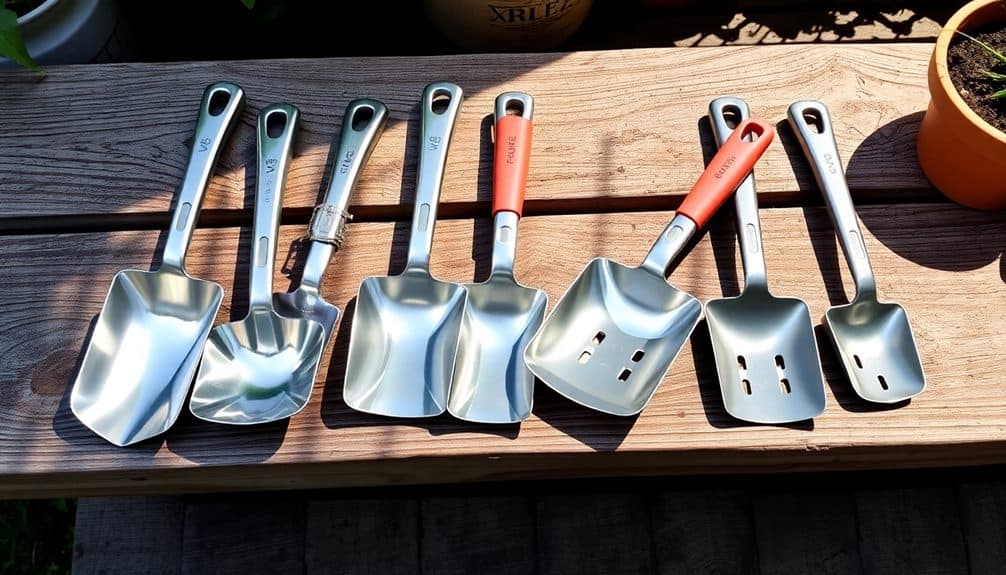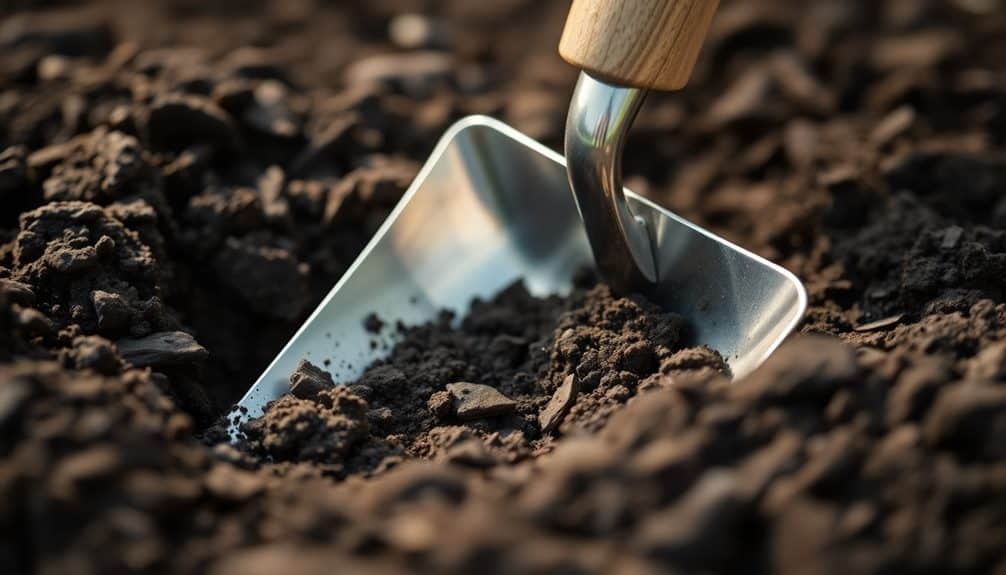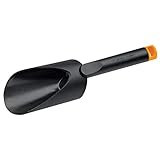This website contains affiliate links. Some products are gifted by the brand to test. As an Amazon Associate, I earn from qualifying purchases. The content on this website was created with the help of AI.
The Fiskars Soil Scoop Hand Shovel leads the pack with its FiberComp construction that’s stronger than steel yet lightweight. You’ll find great value in the Home-X Soil Scoops Set, featuring two mini scoops perfect for delicate plantings. For bonsai enthusiasts, the Black Bonsai Soil Scoop offers precise pouring control, while the colorful 6 Pcs Plastic Bonsai Set provides versatile options for various tasks. The Fiskars Soil Scoop for Potting rounds out the top picks with its eco-friendly design and spill-reducing deep sides. Understanding key features like durability, size, and intended use will help you make the best choice for your gardening needs.
Key Takeaways
- Fiskars Soil Scoop Hand Shovel leads with its FiberComp construction, oversized scoop design, and lifetime warranty for reliable gardening performance.
- Home-X Soil Scoops Set offers two mini scoops perfect for delicate plantings and precise soil placement in smaller containers.
- Black Bonsai Soil Scoops excel in precise pouring and mixing, making them ideal for indoor plants and detailed bonsai work.
- The 6 Pcs Plastic Bonsai Soil Scoops set provides versatile, colorful options with practical funnel shapes for mess-free soil handling.
- Fiskars Soil Scoop for Potting features eco-friendly construction with recycled plastic and holds 1.5 cups for medium-sized planting tasks.
Fiskars Soil Scoop Hand Shovel for Gardening
- GARDENING ESSENTIAL: Dig or transport large scoops of soil and dirt while planting vegetables, or transplanting houseplants; this garden tool can even...
- CONVENIENT AND EFFICIENT: Oversized scoop size displaces more soil to speed up work and has a hang hole for easy storage
- STURDY DESIGN: One-piece design won't loosen, bend at the neck or break while digging
For gardeners on the hunt for versatility, Fiskars Soil Scoop stands out with its FiberComp construction that’s stronger than steel yet remarkably lightweight. The tool’s oversized scoop design lets you efficiently move soil, while its one-piece construction prevents loosening or bending during use.
You’ll find this rust-resistant scoop excels at numerous tasks beyond basic gardening. Whether you’re scooping birdseed, handling granular products, or building sandcastles at the beach, its ergonomic design guarantees comfortable use. While it’s perfect for light gardening and potting work, you’ll want to take into account alternatives for heavy, rocky soil.
The scoop’s durability is backed by a lifetime warranty, and its hang hole makes for convenient storage. Despite its plastic appearance, you’ll appreciate its robust performance in everyday gardening tasks, particularly when working with loose soil or transplanting.
Best For: Home gardeners and hobby landscapers seeking a lightweight, versatile tool for potting, planting, and handling loose materials like soil, seeds, and sand.
Pros:
- Durable FiberComp material is stronger than steel while remaining lightweight and rust-resistant
- Versatile design works well for multiple tasks from gardening to beach activities
- Backed by lifetime warranty with convenient storage hole and one-piece construction
Cons:
- Not suitable for heavy-duty digging or rocky soil conditions
- Small size limits leverage for tougher gardening tasks
- May seem less substantial due to plastic construction despite actual durability
Home-X Soil Scoops Set for Gardening (2 Piece Set)
- 𝐌𝐢𝐧𝐢𝐚𝐭𝐮𝐫𝐞 𝐏𝐥𝐚𝐧𝐭𝐢𝐧𝐠 𝐒𝐜𝐨𝐨𝐩𝐬: Our compact bonsai tree and succulent tools are...
- 𝐌𝐮𝐥𝐭𝐢𝐩𝐮𝐫𝐩𝐨𝐬𝐞 𝐔𝐭𝐢𝐥𝐢𝐭𝐲 𝐓𝐨𝐨𝐥𝐬: Home-X hand scoops aren't just for gardening! Use...
- 𝐈𝐝𝐞𝐚𝐥 𝐟𝐨𝐫 𝐓𝐫𝐚𝐧𝐬𝐩𝐥𝐚𝐧𝐭𝐢𝐧𝐠 𝐚𝐧𝐝 𝐂𝐮𝐥𝐭𝐢𝐯𝐚𝐭𝐢𝐧𝐠:...
Gardening enthusiasts who specialize in small, delicate plants will appreciate the Home-X Set of 2 Soil Scoops. These mini hand scoops come in two sizes – 6½ x 2½ inches and 6¼ x 1¾ inches – perfect for working with succulents, cacti, flowers, and bonsai trees. Their semi-pointed design helps direct soil precisely without spillage.
You’ll find these versatile tools useful beyond gardening, as they work well for scooping bird seed, pet food, ice, or even building sandcastles. The durable plastic construction makes them easy to clean and reuse, supporting eco-friendly practices. While some users note rough edges upon arrival that need smoothing, most praise these scoops for their effectiveness in filling settled soil areas and reducing mess during potting tasks. They’re particularly valuable for indoor plants and precise transplanting work.
Best For: Indoor gardening enthusiasts and plant collectors who work primarily with small, delicate plants like succulents, cacti, and bonsai trees.
Pros:
- Perfect size for precise soil placement and reduced mess when working with small plants
- Versatile use beyond gardening for pet food, bird seed, and other household tasks
- Durable plastic construction that’s easy to clean and reuse
Cons:
- Some units may have rough edges that need smoothing before use
- Limited size makes them impractical for larger gardening tasks
- Basic plastic construction may not be as sturdy as metal alternatives
Black Bonsai Soil Scoops for Garden and Potting
- These soil shovels are easy to use and will help you save more time and energy
- A very easy-to-clean soil spoon for bonsai, which is made of durable plastic, light and portable, and can be used in various potted media
- 1
Indoor plant enthusiasts and bonsai gardeners will find the Black Bonsai Soil Scoop an essential addition to their toolset. Made from thick, durable plastic, these colorful scoops offer precise pouring capabilities that make repotting sessions easier and cleaner.
You’ll appreciate the scoop’s lightweight design and sturdy construction, which helps prevent messy spills while working with your plants. It’s particularly effective for mixing potting soils for cacti, succulents, and indoor plants. While the slender design allows for better handling and precision, you should note that it’s smaller than traditional garden spades.
If you’re primarily working with indoor plants or bonsai, you’ll find the size perfect for detailed work. However, if you’re planning larger gardening projects, you might want to contemplate a bigger alternative for increased soil capacity.
Best For: Indoor gardening enthusiasts, bonsai practitioners, and succulent collectors who need precise control when working with small plants and containers.
Pros:
- Lightweight and precise pouring design prevents messy spills during potting
- Durable plastic construction ensures long-lasting performance
- Perfect size for detailed work with indoor plants and bonsai
Cons:
- Smaller capacity than traditional garden spades
- May be too small for larger gardening projects
- Limited to indoor and small-scale gardening tasks
6 Pcs Plastic Bonsai Soil Scoops & Garden Shovels
- Rich in Quantity: you will receive 6 pieces of garden soil scoops in different colors, including pink, purple, green, white and so on, enough quantity...
- Reliable Material: the potting spoons are made of quality plastic material, reliable and reusable, lightweight and portable, safe and sturdy, not easy...
- Practical Tools: these garden scoops are suitable for transplanting plants such as succulents, cactus, flowers and so on, you can also use them to...
Plant enthusiasts seeking a versatile gardening toolkit will find exceptional value in these six colorful plastic soil scoops. Available in pink, purple, green, and white, these lightweight tools excel at transplanting succulents, cacti, and flowers while making soil handling precise and mess-free.
You’ll appreciate the practical funnel shape design that’s perfect for both indoor and outdoor gardening tasks. The durable plastic construction won’t weigh you down, and the scoops stack neatly for easy storage. They’re especially helpful if you’re dealing with hand sensitivities or prefer minimal contact with dirt.
Beyond gardening, you’ll find these scoops useful for pet food dispensing and beach activities. Their proven durability in direct sunlight and positive user feedback make them a reliable choice for your potting and transplanting needs.
Best For: Home gardeners, plant enthusiasts, and anyone seeking lightweight, versatile tools for indoor/outdoor planting, repotting, and soil handling tasks.
Pros:
- Lightweight and stackable design makes them easy to store and handle
- Versatile use beyond gardening, including pet food dispensing and beach activities
- Multiple bright colors and ergonomic shape ideal for precise soil handling with minimal mess
Cons:
- Plastic construction may not be as durable as metal alternatives
- May be too small for larger gardening projects
- Limited color selection might not appeal to all users
Fiskars Soil Scoop for Potting and Transplanting
- Fiskars Soil Scoop is perfectly sized for transferring soil into medium-sized planters on patios, balconies and indoors
- Made of durable, lightweight resin with 20% post-consumer recycled plastic
- Flat bottom keeps scoop from tipping from side to side when set on a flat surface. Deep sides maximize capacity and prevent spills
Designed for medium-sized planters, the Fiskars Soil Scoop excels at soil transfer tasks while proving especially valuable for urban gardeners with limited space. Made from durable resin containing 20% recycled plastic, this lightweight tool holds approximately 1.5 cups of soil and features a flat bottom that prevents tipping.
You’ll appreciate the scoop’s deep sides that maximize capacity and minimize spills during potting and transplanting work. The tool’s snout design enables precise soil placement, and its aesthetic appeal means you won’t mind leaving it displayed among your plants. While some users have reported missing parts upon delivery, Fiskars’ responsive customer service and lifetime warranty guarantee long-term satisfaction. The scoop’s combination of functionality and durability makes it a worthwhile investment for your gardening toolkit, especially if you’re working with indoor plants or container gardens.
Best For: Indoor and urban gardeners who need a reliable tool for transferring soil to medium-sized planters in confined spaces like patios, balconies, and indoor gardening areas.
Pros:
- Durable yet lightweight design with deep sides and flat bottom to prevent spills and tipping
- Attractive aesthetics that make it display-worthy among plants while being highly functional
- Made with eco-friendly recycled materials and backed by a lifetime warranty
Cons:
- Some customers report missing parts upon delivery
- Product labels can be difficult to remove without scratching the surface
- Limited capacity (1.5 cups) may require multiple scoops for larger planting projects
Factors to Consider When Choosing Soil Scoops

When you’re in the market for a soil scoop, you’ll want to evaluate several key factors that directly impact its performance and longevity. You should consider the material and build quality for durability, size and weight options that match your needs, and whether the intended usage aligns with your gardening tasks. The handle design’s comfort, along with storage and portability features, will also play significant roles in making your soil scoop a valuable gardening tool.
Material and Build Quality
The durability and performance of your soil scoop largely depend on its material composition and construction quality. When you’re evaluating material options, you’ll find that fiber composite and thick plastic varieties offer excellent resistance to both bending and rusting, ensuring your tool maintains its shape and functionality over time.
Look for scoops featuring one-piece construction, as this design eliminates weak points where parts might loosen or separate during regular use. High-quality plastics aren’t just durable; they’re also lightweight, which means you won’t tire as quickly during extended gardening sessions. The reduced weight doesn’t compromise strength when you’re choosing premium materials.
You’ll want to pay attention to the handle design, as ergonomic features greatly improve your grip and control while scooping and transferring soil. If environmental sustainability is important to you, consider scoops made from post-consumer recycled plastics. These eco-friendly options deliver comparable performance while reducing your environmental impact.
Remember that superior build quality often translates to better value in the long run, as you won’t need to replace your scoop as frequently. A well-constructed soil scoop should feel solid in your hands and demonstrate consistent performance throughout its lifetime.
Size and Weight Options
Beyond material considerations, proper sizing and weight can make or break your gardening experience. When you’re selecting a soil scoop, you’ll need to match the size to your specific gardening tasks. Large scoops excel at transferring bulk soil quickly, making them ideal for filling bigger pots or garden beds. However, if you’re working with smaller containers or delicate seedlings, you’ll want a more precise, smaller scoop that allows for controlled portions.
Weight is equally important in your selection process. You’ll want a scoop that’s light enough to prevent hand fatigue during extended use, especially if you’re planning lengthy gardening sessions. Look for a scoop that feels balanced in your hand and doesn’t strain your wrist or fingers during repeated movements. The scoop’s dimensions should correspond to the size of your typical planting containers – if you mainly work with small pots, a compact scoop will serve you better than an oversized one. While lightweight plastic options can reduce fatigue, don’t compromise on durability. The best choice combines manageable weight with sturdy construction that won’t bend or break under regular use.
Intended Usage Purpose
Selecting a soil scoop starts with understanding your primary gardening needs. If you’re mainly focused on potting and transplanting, you’ll want to look for designs specifically tailored to these tasks, with features that help you manage soil effectively while minimizing mess.
For those working with delicate plants like succulents or bonsai trees, you’ll benefit from mini scoops with semi-pointed designs. These allow you to direct soil with precision, helping you avoid spills that could damage sensitive plants. If your gardening projects involve moving larger quantities of soil or heavier materials, you’ll find that sturdier scoops with oversized capacities can greatly improve your efficiency.
Consider choosing a versatile scoop that serves multiple purposes beyond gardening. You might want one that’s equally effective for scooping birdseed or transferring ice, making it a more valuable tool in your collection. When evaluating options, pay attention to the scoop’s material composition. You’ll want something that’s both lightweight and durable, ensuring easy handling during use while also being simple to clean and maintain for long-term reliability.
Handle Design Comfort
Mastering handle comfort plays an essential role in choosing the right soil scoop for your gardening needs. When you’re spending hours potting plants or working in your garden, you’ll want a soil scoop that won’t leave your hands fatigued or strained.
Look for ergonomic designs that feature wide, contoured grips to distribute force evenly across your palm. You’ll find that handles made from rubber or textured plastics offer superior comfort through their cushioning properties while preventing slips when you’re working with wet soil. The grip width should feel natural in your hand, allowing you to maintain control without straining your fingers.
Pay close attention to the handle’s angle relative to the scoop. A well-designed angle will keep your wrist in a natural position, reducing strain during repetitive scooping motions. You don’t want to fight against an awkward grip angle that could lead to discomfort over time.
When testing different scoops, check that the handle provides enough surface area for a secure grip. You’ll need stability when working with various materials, and a properly sized handle will help you maintain precise control while protecting your hands from fatigue.
Storage and Portability
At the end of a long day gardening, you’ll want a soil scoop that’s both easy to store and transport. The key is finding a lightweight, compact design that won’t take up excessive space in your tool shed or garden bag.
When selecting your soil scoop, look for models with built-in hang holes, which let you easily mount the tool on garage walls or garden tool racks. If you’re dealing with limited storage space, contemplate stackable scoops that nest together efficiently. Durable plastic options are particularly practical, as they’re lightweight enough to carry around while maintaining their strength and functionality.
You’ll get the most value from a versatile scoop that serves multiple purposes, eliminating the need to store and transport several different tools. Whether you’re potting plants, mixing soil, or measuring materials, a multi-functional scoop streamlines your gardening toolkit.
Don’t forget to ponder cleaning requirements before storage. Choose a scoop that’s easy to rinse and dry, preventing dirt buildup that could affect storage conditions. A quick-cleaning scoop means you can put it away immediately after use without worrying about accumulated debris or moisture issues.
Price Versus Durability
When shopping for soil scoops, you’ll quickly notice the price range can vary considerably based on material quality and construction. While it’s tempting to opt for less expensive options, investing in a higher-priced, durable soil scoop often proves more cost-effective in the long run.
Premium soil scoops made from materials like FiberComp or heavy-duty plastic offer superior resistance to wear and tear, maintaining their shape and functionality even after extensive use. You’ll find these tools perform better in demanding tasks like scooping compacted soil or transplanting larger plants. Many premium models also come with lifetime warranties, which speaks volumes about their durability and the manufacturer’s confidence in their products.
When evaluating price versus durability, consider how frequently you’ll use the tool and the types of tasks you’ll perform. If you’re an avid gardener who regularly works with soil, spending more on a durable scoop will save you money by eliminating the need for frequent replacements. The enhanced performance of higher-quality scoops also means you’ll work more efficiently, making the investment worthwhile for both casual and serious gardeners.
Frequently Asked Questions
Can Soil Scoops Be Used for Mixing Concrete or Other Construction Materials?
You can use soil scoops for mixing small amounts of concrete and construction materials, but they’re not the best tool for the job. You’ll find that dedicated concrete mixing tools, like mixing paddles or trowels, work much better. If you decide to use a soil scoop, choose a sturdy metal one since plastic versions may crack under the weight and abrasiveness of concrete materials.
How Do You Properly Sanitize Soil Scoops Between Different Garden Beds?
You’ll want to thoroughly clean and sanitize your scoops between garden beds to prevent cross-contamination and disease spread. First, remove all dirt with hot water and soap, scrubbing well. Then spray or wipe with a 10% bleach solution or rubbing alcohol and let it sit for 5 minutes. Rinse completely and dry before next use. For added protection, you can also leave tools in direct sunlight to further disinfect.
Are Soil Scoops Safe to Use in Children’s Sandbox Play?
Playing in the sand should be as safe as a mother’s hug. You’ll want to be cautious about using garden soil scoops in children’s sandboxes since they can have sharp edges and may harbor harmful bacteria from soil contact. Instead, opt for plastic sand toys specifically designed for kids’ play. They’re safer, more colorful, and won’t rust or cause injury during those precious sandbox adventures.
What’s the Average Lifespan of a Plastic Soil Scoop With Regular Use?
You’ll typically get 2-3 years of regular use from a plastic soil scoop before it shows significant wear. However, your scoop’s lifespan depends on how you use and store it. If you’re using it gently and keeping it protected from extreme temperatures and UV exposure, it could last up to 5 years. Heavy use, rough handling, or leaving it outside can reduce its life to just one season.
Can Soil Scoops Be Used for Measuring Exact Quantities of Soil?
While you can use soil scoops for rough measurements, they’re not designed for exact quantities. If you need precise measurements, you’ll want to use proper measuring tools like graduated containers or weight scales. However, many scoops do come with approximate volume markings that can help you estimate amounts. For consistent results in gardening or potting, it’s better to rely on dedicated measuring tools.









